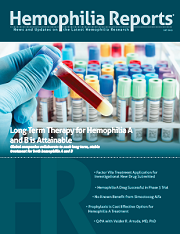Publication
Article
Hemophilia Reports
Hemophilia Patients at Risk for Cardiovascular Disease as They Age
Author(s):
An aging population of hemophilia patients is at risk for various cardiovascular diseases.

As the population of people with hemophilia (PWH) age, cardiovascular health care providers will see more conditions that need special attention in this population, according to research published in Cardiology in Review.
A multifaceted team of researchers conducted a meta-analysis of current literature in order to examine, summarize, and review the existing recommendations for cardiovascular disease (CVD) for the PWH population. The researchers searched databases for papers in English pertaining to CVD in PWH that were published between 1980 and 2013. This group requires specialized care, the researchers stressed, and that was the reasoning behind the multidisciplinary team that contributed to the study.
First, the researchers discussed the underlying disease course, life expectancy, and age related CVD in PWH. The researchers noted the leading cause of death in PWH included age related diseases like sepsis (38 percent), congestive heart failure (30 percent), respiratory failure (28 percent), and pneumonia (25 percent), rather than intracranial hemorrhage or HIV (16 percent). However, as the hemophilic population ages, comorbidities like ischemic heart disease (IHD), other atherosclerotic conditions, and degenerative valve disease are also expected to rise.
Some studies suggest mortality from IHD is lower in PWH than the general population due to a “hypocoagulable” state, while other studies suggest increased levels of FVIII and FIX in PWH predispose them to atherogenesis. Reduced FVIII or FIX levels do not seem to protect against IHD or other CVD though, the researchers wrote, and instead the risks factors seem to correlate to traditional CVD risk rather than hemophilia status.
Being familiar with hemophilia treatment practices — particularly treatment or prevention of bleeding – is important for cardiovascular health providers, the researchers said. For example, before some surgical procedures on PWH, between 80 and 100 percent of normal correction of factor activity level is preferred to optimize hemostasis. When PWH require CVD related operations, health care providers are recommended to aim to maintain hemostasis when possible.
For PWH, CVD management is aligned with general principles practiced for the healthy population, though unique challenges exist. One age-related concern is non-valvular atrial fibrillation (AF) that requires antithrombotic therapy to prevent associated thromboembolic events like stroke. PWH who develop AF are not immune to thromboembolic events, the researchers warned, and prophylaxis treatment may be a reasonable option. Anti-platelet and antithrombotic pharmacotherapies are important to treating PWH with IHD, the researchers advised.
“As the population of PWH ages, cardiovascular health care providers will encounter increasing numbers of PWH presenting with typical age related cardiovascular conditions, in addition to other acquired or congenital conditions spanning all ages,” the authors concluded. “To optimize resource utilization and clinical outcome and to minimize bleeding risk and complications, close consultation with a hematologist, ideally in association with a hemophilia treatment center, is essential.”





